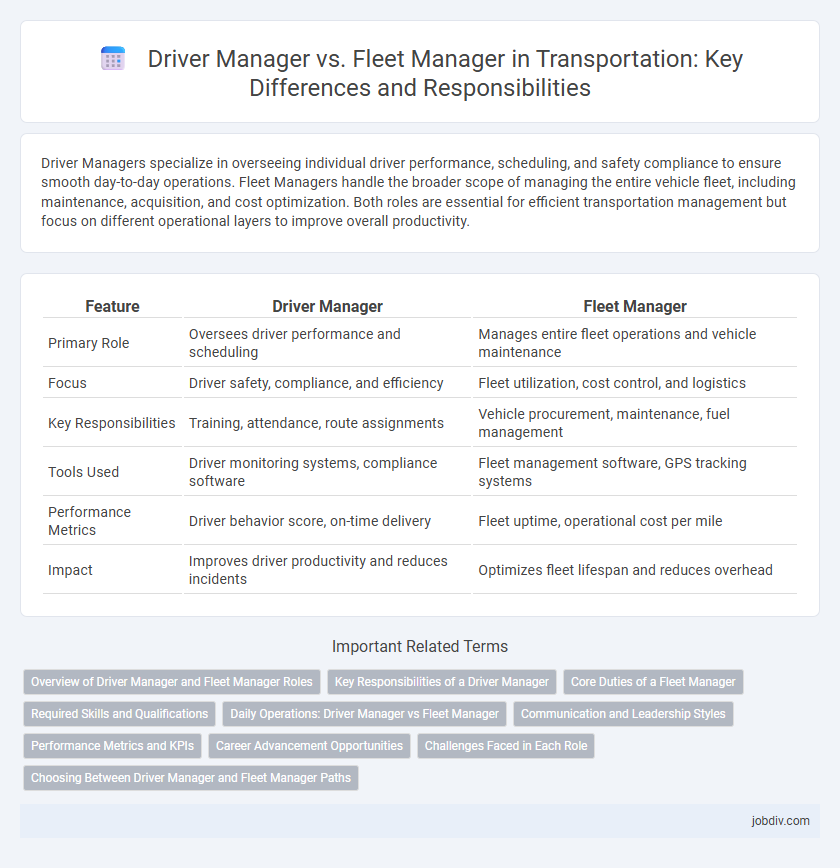Driver Managers specialize in overseeing individual driver performance, scheduling, and safety compliance to ensure smooth day-to-day operations. Fleet Managers handle the broader scope of managing the entire vehicle fleet, including maintenance, acquisition, and cost optimization. Both roles are essential for efficient transportation management but focus on different operational layers to improve overall productivity.
Table of Comparison
| Feature | Driver Manager | Fleet Manager |
|---|---|---|
| Primary Role | Oversees driver performance and scheduling | Manages entire fleet operations and vehicle maintenance |
| Focus | Driver safety, compliance, and efficiency | Fleet utilization, cost control, and logistics |
| Key Responsibilities | Training, attendance, route assignments | Vehicle procurement, maintenance, fuel management |
| Tools Used | Driver monitoring systems, compliance software | Fleet management software, GPS tracking systems |
| Performance Metrics | Driver behavior score, on-time delivery | Fleet uptime, operational cost per mile |
| Impact | Improves driver productivity and reduces incidents | Optimizes fleet lifespan and reduces overhead |
Overview of Driver Manager and Fleet Manager Roles
Driver Managers oversee driver performance, compliance with safety regulations, and training programs to ensure efficient and secure transportation operations. Fleet Managers are responsible for managing vehicle maintenance, optimizing route planning, and controlling operational costs to maximize fleet productivity. Both roles are crucial for maintaining a reliable and cost-effective transportation system.
Key Responsibilities of a Driver Manager
Driver Managers oversee the recruitment, training, and scheduling of drivers to ensure compliance with safety regulations and company policies. They monitor driver performance through regular evaluations, address disciplinary issues, and coordinate communication between drivers and operations teams. Efficient routing and load assignments also fall under their responsibility to optimize timely deliveries and reduce operational costs.
Core Duties of a Fleet Manager
Fleet managers oversee vehicle maintenance schedules, monitor fuel consumption, and ensure compliance with transportation regulations to optimize fleet performance. They coordinate driver assignments, manage vehicle acquisition and replacement, and analyze operational data to reduce costs and improve efficiency. Unlike driver managers who focus primarily on individual driver performance and logistics, fleet managers maintain strategic control over the entire vehicle fleet's productivity and safety.
Required Skills and Qualifications
Driver Managers require strong interpersonal communication skills, knowledge of traffic laws, and experience in driver training and safety protocols to ensure compliance and efficient route management. Fleet Managers need expertise in logistics, vehicle maintenance, budgeting, and data analysis to optimize fleet performance and reduce operational costs. Both roles demand leadership abilities, proficiency in fleet management software, and a keen understanding of regulatory requirements in transportation.
Daily Operations: Driver Manager vs Fleet Manager
Driver Managers oversee daily driver schedules, ensuring optimal route assignments and compliance with driving hours regulations, while Fleet Managers coordinate vehicle maintenance, fuel management, and overall fleet availability. Driver Managers focus on monitoring driver performance and resolving on-road issues promptly, whereas Fleet Managers manage asset utilization and strategic deployment of vehicles to maximize operational efficiency. Both roles are critical for seamless transportation operations, balancing human resource management with vehicle logistics to ensure timely deliveries and service reliability.
Communication and Leadership Styles
Driver Managers prioritize direct, clear communication to coordinate daily routes and address immediate driver concerns, employing a hands-on leadership style that emphasizes problem-solving and real-time decision-making. Fleet Managers adopt a broader communication approach, integrating data-driven reports and strategic briefings to oversee vehicle maintenance schedules, compliance, and overall fleet performance with a leadership style centered on long-term planning and resource optimization. Effective collaboration between Driver Managers and Fleet Managers depends on aligning their communication methods and leadership strategies to streamline operations and enhance fleet efficiency.
Performance Metrics and KPIs
Driver Managers focus on individual driver performance metrics such as on-time deliveries, adherence to safety protocols, and driver behavior scores to ensure efficiency and safety. Fleet Managers emphasize KPIs related to vehicle utilization, maintenance costs, fuel efficiency, and overall fleet uptime to optimize operational costs and asset longevity. Both roles use telematics data and real-time analytics to monitor performance and implement improvements in transportation management.
Career Advancement Opportunities
Driver managers primarily focus on supervising individual drivers, ensuring compliance with safety regulations, and managing daily schedules, which provides a foundation for leadership skills in transportation. Fleet managers oversee the entire vehicle fleet, optimizing asset utilization, implementing cost-saving strategies, and coordinating maintenance, offering broader operational management experience. Career advancement opportunities often lead driver managers to progress into fleet management roles, leveraging their hands-on driver experience to manage larger transportation operations efficiently.
Challenges Faced in Each Role
Driver Managers face challenges such as ensuring driver compliance with safety regulations, managing work schedules to prevent fatigue, and addressing varied driver performance levels across diverse routes. Fleet Managers struggle with maintaining vehicle uptime, optimizing fuel efficiency, and coordinating timely repairs while balancing budget constraints. Both roles require effective communication and problem-solving skills to handle operational disruptions and regulatory changes.
Choosing Between Driver Manager and Fleet Manager Paths
Selecting between a Driver Manager and Fleet Manager career depends on specialization and organizational focus. Driver Managers prioritize monitoring and supporting individual driver performance, compliance, and training to enhance safety and efficiency. Fleet Managers oversee entire vehicle operations, including maintenance scheduling, route optimization, and fleet cost control, appealing to those targeting broader logistical responsibilities.
Driver Manager vs Fleet Manager Infographic

 jobdiv.com
jobdiv.com